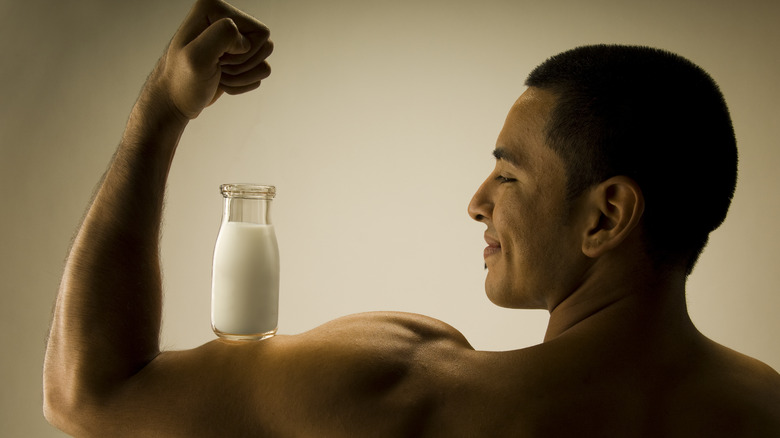What Happens To Your Muscles When You Drink Milk Every Day
If you talk to serious bodybuilders at the gym, they'll probably tell you how many tubs of whey protein powder they go through in a month. That's because your body absorbs whey protein quickly to help build muscles. Whey protein comes from cow's milk, so you'd think it might be simpler and cheaper to drink a glass of milk after a workout rather than make a shake from whey protein powder.
A cup of low-fat milk provides a little more than 8 grams of protein, but less than 2 grams of that protein comes from whey protein. The rest of the protein in milk is casein, which digests slower than whey. What does this mean for your muscles when you drink milk? Milk is a high-quality protein, meaning that it has all the essential amino acids your body needs to repair tissues. What's more, milk has the branched-chain amino acid leucine to help build muscle.
Milk is good after a workout
Athletes might remember the "Built with Chocolate Milk" campaign in 2012 that showed various professional athletes promoting chocolate milk as a recovery drink. A 2012 review in Medicine and Sport Science showed that the 4-to-1 ratio of carbohydrates to protein in chocolate milk makes it a lower-cost recovery drink to help repair the muscles.
You don't even need to add chocolate to your milk for it to build muscle. Not only is milk the best way to hydrate, but it also has the muscle-building power that beats out processed recovery drinks, according to a 2018 article in the European Journal of Sport Science.
Milk benefits the young, but it also helps older adults too, says a 2021 article in Foods. Residents of a nursing home who had age-related muscle loss participated in resistance training three days a week. The two groups that drank 200 milliliters (less than a cup) of milk or soy milk in the morning and after their workouts built more muscle and improved strength than the group that didn't drink either type of milk.
A 2021 meta-analysis in The Journal of Nutrition looked at 27 studies that compared the qualities of protein sources on muscle building after resistance exercise. Higher-quality protein, such as milk, is better for synthesizing muscle after a workout and supporting muscle building during long-term resistance training for young adults under 35 and older adults over 60.
Drink milk to support exercise
Milk is also a great drink to get more protein throughout the day. In a 2017 position statement, the International Society of Sports Nutrition says that you should distribute your protein throughout your day, about every three or four hours. To maximize muscle building, your protein source should have the essential amino acids and at least 700 milligrams of leucine. Milk has 841 milligrams of leucine. You might also want to drink milk before bed since the slow-digesting casein protein will continue to work on building muscles while you sleep.
You don't need to drink too much milk to build and repair muscle. You need about 1.4 to 2 grams of protein for each kilogram of body weight, which comes to 95 to 136 grams of protein for someone weighing 150 pounds. You might not get all of that protein from milk, so you might need to find other high-quality protein sources to meet your protein needs. However, milk or any high-quality protein won't build muscle if you don't exercise.



